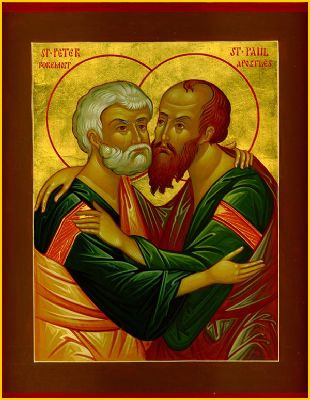|
|||
|---|---|---|---|
| This weekly bulletin insert complements the curriculum published by the Department of Christian Education of the Orthodox Church in America. This and many other Christian Education resources are available at http://dce.oca.org. | |||

The Church honors the two great apostles Peter and Paul. Both men faced hostility, danger and powerful enemies as they traveled and preached the good news of the Gospel. Both, in their own ways, spoke about what happens after we die. Saint Paul famously described the mystery of our resurrection: "We shall not all sleep, but we shall all be changed, in a moment, in the twinkling of an eye, at the last trumpet. For the trumpet will sound, and the dead will be raised imperishable, and we shall be changed. For this perishable nature must put on the imperishable, and this mortal nature must put on immortality" (I Corinthians 15: 54). Saint Peter, to encourage his fellow Christians who were facing persecution, wrote: "You have been born anew, not of perishable seed but of imperishable, through the living and abiding word of God" (I Peter 1: 23). In the same letter he reminded them after they suffer on earth, "the God of all grace, who has called you to His eternal glory in Christ, will himself restore, establish, and strengthen you" (5:10). The words they wrote, and the things they endured, mark these apostles as men of faith. They also had visions sent by God. This is why we can trust their assurances that we are in God's hands while we live and after we die. In Clint Eastwood's movie "Hereafter" there is no attempt to assure us that we can trust anybody's words about what happens after we die, though that is a matter of concern to the three main characters. One is Marie, a tsunami survivor who had a near-death experience when the waves overtook her. The second is a young boy who longs to speak with the twin brother who has died suddenly in a car accident. The third, and most compelling, is George, who feels "cursed" with the authentic psychic power he possesses to connect with the dead. He hates being asked to give "readings" because the emotional toll is so heavy for all involved. The movie doesn't come to any conclusions. When Marie tries to tell her lover that her experience has convinced her there must be "something" after we die, he responds, "If there were something, don't you think somebody would have proved it by now?"
The young boy, Marcus, consults various fake mediums and of course is disappointed. When he finally persuades the reluctant George to give him a reading, he feels that he has at last connected with his dead brother. But even George cannot tell him what happens, or where we go, after we die. Marcus protests, "But you've done all those readings!" George can only answer quietly, "I still don't know." This movie reflects the curiosity of many people about "the hereafter." But its creators apparently aren't curious enough to investigate the accounts given by the apostles Peter and Paul, who could tell them all they need to know. |
|||
